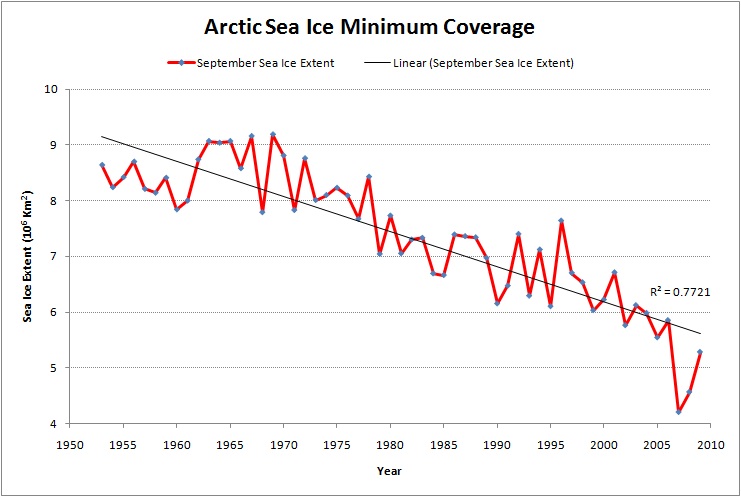 Arguments
Arguments
 Software
Software
 Resources
Comments
Resources
Comments
 The Consensus Project
The Consensus Project
 Translations
Translations
 About
Support
About
Support


Latest Posts
- Skeptical Science New Research for Week #6 2026
- The future of NCAR remains highly uncertain
- Fact brief - Can solar projects improve biodiversity?
- How the polar vortex and warm ocean intensified a major US winter storm
- 2026 SkS Weekly Climate Change & Global Warming News Roundup #05
- Help needed to get translations prepared for our website relaunch!
- Skeptical Science New Research for Week #5 2026
- Climate Variability Emerges as Both Risk and Opportunity for the Global Energy Transition
- Fact brief - Are solar projects hurting farmers and rural communities?
- Winter 2025-26 (finally) hits the U.S. with a vengeance
- 2026 SkS Weekly Climate Change & Global Warming News Roundup #04
- Skeptical Science New Research for Week #4 2026
- WMO confirms 2025 was one of warmest years on record
- Fact brief - Do solar panels release more emissions than burning fossil fuels?
- Keep it in the ground?
- 2026 SkS Weekly Climate Change & Global Warming News Roundup #03
- Skeptical Science New Research for Week #3 2026
- Climate Adam - Will 2026 Be The Hottest Year Ever Recorded?
- Fact brief - Does clearing trees for solar panels release more CO2 than the solar panels would prevent?
- Where things stand on climate change in 2026
- 2026 SkS Weekly Climate Change & Global Warming News Roundup #02
- Skeptical Science New Research for Week #2 2026
- UK renewables enjoy record year in 2025 – but gas power still rises
- Six climate stories that inspired us in 2025
- How to steer EVs towards the road of ‘mass adoption’
- 2026 SkS Weekly Climate Change & Global Warming News Roundup #01
- Skeptical Science New Research for Week #1 2026
- 2025 in review - busy in the boiler room
- Direct Air Capture
- IEA: Declining coal demand in China set to outweigh Trump’s pro-coal policies
Archived Rebuttal
This is the archived Basic rebuttal to the climate myth "Arctic sea ice has recovered". Click here to view the latest rebuttal.
What the science says...
|
Thick arctic sea ice is in rapid retreat. |
Discussions about the amount of sea ice in the Arctic often confuse two very different measures of how much ice there is. One measure is sea-ice extent which, as the name implies, is a measure of coverage of the ocean where ice covers 15% or more of the surface. It is a two-dimensional measurement; extent does not tell us how thick the ice is. The other measure of Arctic ice, using all three dimensions, is volume, the measure of how much ice there really is.
Sea-ice consists of first-year ice, which is thin, and older ice which has accumulated volume, called multi-year ice. Multi-year ice is very important because it makes up most of the volume of ice at the North Pole. Volume is also the important measure when it comes to climate change, because it is the volume of the ice – the sheer amount of the stuff – that science is concerned about, rather than how much of the sea is covered in a thin layer of ice*.
Over time, sea ice reflects the fast-changing circumstances of weather. It is driven principally by changes in surface temperature, forming and melting according to the seasons, the winds, cloud cover and ocean currents. In 2010, for example, sea ice extent recovered dramatically in March, only to melt again by May.
Sea-ice is subject to powerful short-term effects so while we can't conclude anything about the health of the ice from just a few years' data, an obvious trend emerges over the space of a decade or more, showing a decrease of about 5% of average sea-ice cover per decade.

Source: Rayner et.al, 2004, updated
Where has the thick ice gone?
When we consider the multi-year ice and look at the various measurements of it, we see a steep decline in this thick ice. As you might imagine, thick ice takes a lot more heat to melt, so the fact that it is disappearing so fast is of great concern.

Source: Polar Science Centre, University of Washington
It is clear from the various data sets, terrestrial and satellite, that both the sea ice extent and multi-year ice volume are reducing. Sea ice extent recovered slightly during the Arctic winters of 2008-09, but the full extent of annual ice reduction or gain is seen in September of each year, at the end of the Arctic summer. The volume of multi-year ice has not recovered at all, and is showing a steeply negative trend.
* Footnote: Although a thin layer of ice doesn’t tell us much about the overall state of ice loss at the Arctic, it does tell us a great deal about Albedo, the property of ice to reflect heat back into space. When the sea ice diminishes, more heat passes into the oceans. That heat melts the thick ice and speeds up the melting of thinner sea ice, which in turns allows more heat to accumulate in the oceans. This is an example of a positive feedback.
Basic rebuttal written by GPWayne
Update July 2015:
Here is a related lecture-video from Denial101x - Making Sense of Climate Science Denial
Updated on 2015-07-14 by MichaelK.
THE ESCALATOR

(free to republish)
























































